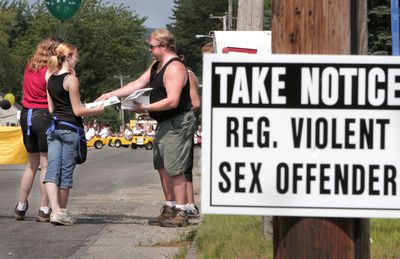-
Incarceration is not the worst sentence justice system can impose

I’m a public defender. My clients would rather go to jail than register as sex offenders.
When I first became a public defender, I believed the worst punishment that my clients would face would be time in jail. Since then, I’ve learned that incarceration is not the only — and perhaps not the worst — punishment the criminal justice system can impose. The registration requirements imposed on those convicted of sex offenses are unfairly harsh and punitive, though few recognize them as such.
I had always assumed that sex offender registration was limited to those who committed the most egregious and dangerous offenses. I had also trusted that the Supreme Court was right when, in 2003, it stated that sex offender registration laws are not punishments but merely administrative requirements to protect public safety.
But I realize now that many of my clients would choose to take on more jail time, more fees — anything to avoid being labeled a sex offender for life. That’s because our current sex offender registration laws apply an unbending and inhumane one-size-fits-all approach that does not prevent future sex crimes and in fact makes us all less safe.
The registration process appears designed to make people fail. The rules are so complicated that few non-attorneys can keep up with them.
Highlights:
Far too many people have to register as sex offenders
The category of crimes that require one to register as a sex offender in California — which has more registered sex offenders than any other state— is a grossly overbroad one. It encompasses those who, have been convicted of sexual assault, but also people who committed even minor, misdemeanor conduct. There are the crimes one would expect to see labeled as serious sex offenses — rape, child molestation, sexual assault — but there are also offenses like peeing in public, which can qualify as indecent exposure. Similarly, grabbing someone’s butt or masturbating in one’s own car also qualify as sex registerable offenses, even though they are punishable as misdemeanors. We may not want to legalize those behaviors, but forcing someone to be labeled a sex offender for life over a misdemeanor that is only punishable at its maximum by six months in county jail is excessive.
The state nonetheless treats all members of this “sex offender” class harshly, regardless of the underlying offense. All “sex offenders” must comply with strict requirements, including regular registration, residency restrictions, and lifetime consequences damaging their personal and professional lives long after they’ve served their time, including the public shaming of having their names, faces, and addresses plastered online by the government. Reasonable minds may differ about whether some of these restrictions make sense for the most violent offenders, but that’s only a fraction of the people affected by sex offender laws.
Complying with the sex offender registry rules is a huge challenge
The registration process appears designed to make people fail. The rules are so complicated that few non-attorneys can keep up with them. In California, a former sex offender with a steady place to live must register annually for life. But whenever he moves, he must register within five days of relocating (it’s only three days in some states). If he suddenly becomes homeless (likely because he can’t get a job with the public label “sex offender”) he must register as homeless within five days and then reregister as homeless every 30 days. In Georgia, it’s even worse: A homeless sex offender must register every time he changes sleeping locations within just 72 hours.
Sex-offender data is used to collect money and intimidate Rationale for Registry Reform
One thought on “Incarceration is not the worst sentence justice system can impose”
Leave a Reply
Incarceration is not the worst sentence justice system can impose
Arizona MVD a Bit Unusual
Make sure you know current requirements. You can go to your Sheriff's Office website to see if there is new information there. If so, we suggest you do a screen print and save it. Call your registry office to get clarification on any questions you might have. Document the date, time, who you spoke with and their instructions regarding any address change, vehicle, employment, travel dates if required, etc.
Keep in mind if you are required to update your drivers license annually through the Department of Motor Vehicles (DMV) you should contact them for their status.
Be safe, be smart, stay healthy and know we will get through this.Stay Updated with Arizona W.A.R.
All information is confidential and we do not distribute any data whatsoever.
The W.A.R. Support Line:
Links to and From WAR
WAR




The only thing I did not understand or see in this article was in respect to the title of the article. The author never said what sentences were given out for “avoiding” a sex offense. Does any one see what he was talking about, or where he says anything about the title of the article other than the third paragraph where he is mentioning, “many of my clients would choose to take on more jail time, more fees — anything to avoid being labeled a sex offender for life.”? He failed to address this as to what crimes and what sentences. I don’t see his point because there is no crime involving a sexually motivated offense that would NOT put you on the registry.